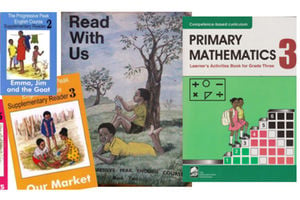
Parents and guardians shop for textbooks and other school essentials at Savanis Bookshop on Latema Road, Nairobi, on December 30, 2023.
Learners in pre-primary and primary school will have new textbooks in January 2025 following the first review of the content of the competency-based curriculum (CBC).
The process to replace the textbooks that have been in use has already kicked off and publishers yesterday submitted manuscripts for evaluation to the Kenya Institute of Curriculum Development (KICD). The institute had invited submissions of materials for all learning areas in pre-primary I and II and Grades 1 to 4.
The CBC was rolled out in 2019 and has faced various challenges ranging from distribution of textbooks to schools to complaints about the quality of the learning materials.
According to a timeline by KICD, the new books are scheduled to be distributed to public schools between September 2, 2024 and November 5, 2024. However, parents with children who attend private schools will have to buy the new books for their children as schools open for the first term.
The review of the curriculum content comes after recommendations contained in the report of the Presidential Working Party on Education Reforms (PWPER). Among the changes proposed concerned better quality of the materials and also the procurement procedures.
“Books provided by the government were of poor quality in content and material. The one textbook per learning area or subject was based on the cheapest rather than the best in content quality. Other areas of concern raised were oversupply and undersupply of textbooks, while some learning areas lack books completely,” reads the report.
The government has been supplying all schools with only one title per subject, per class, usually the cheapest among the books that are passed by the KICD. The PWPER recommended that after evaluation by KICD, the best two textbooks be supplied to each public school. It is not yet clear whether this will be implemented.
In a break from the past, textbooks for English language activities and Kiswahili language activities shall be evaluated for the open market only.
The new textbooks from January next year for pre-school will be in creative arts, environmental activities, mathematics activities, language activities, religious education activities (each as a stand-alone material; Hindu Religious Education, Islamic Religious Education and Christian Religious Education).
For primary school, publishers submitted materials for creative activities, environmental activities, mathematics activities, religious education (again as a stand-alone material), English language activities, Kiswahili language activities and indigenous language activities.
In the capitation matrix under the Free Primary Education (FPE) programme, each learner is allocated Sh1,420 per annum. Of this amount, Sh216.13 is meant for textbooks and supplementary readers. Sh20.09 is for their maintenance. Exercise books take Sh305.64, while teachers’ guides and reference materials take Sh107.99 per learner.
“All participating publishers will be required to specify a maximum retail price at which the Learner’s Book and the accompanying Teacher’s Guide will be offered for sale to schools, if approved. This maximum retail price can only be adjusted upwards if there has been a demonstrable increase in costs of more than six per cent since the Submission for Evaluation and Approval deadline. Any revision of price downwards would be welcome,” the KICD tender document reads.
Learners in pre-school are not covered in the FPE because ECDE is a function of devolved governments.
It also made a case for the strengthening of KICD’s capacity to publish course books in areas where publishers do not submit manuscripts for evaluation.
Procurement and distribution of the textbooks is coordinated by KICD on behalf of the Ministry of Education but this is set to change. The ministry has drafted amendment Bills to incorporate recommendations of the PWPER and among them is the proposal to restructure the School Equipment Production Unit to School Learning and Instructional Materials Centre (SLIMC).
It will be expected to take over the coordination of procurement and distribution of MoE-approved textbooks and other learning resources.
According to the KICD timeline, the results of the evaluation will be released on May 10 and dissatisfied publishers have one week to appeal. The institute will respond to such complaints by May 24, after which it shall engage publishers to make corrections to the successful manuscripts.
They are expected to submit the corrected copies by June 21, with the publication and printing of the books expected between July 20 and August 30.
Publishers also submitted course materials for Grade 9 which will be the last class for junior school. The manuscripts are for pre-technical studies (including business and computer studies), agriculture and nutrition, creative arts, indigenous language and foreign languages (Arabic, Mandarin, French and German).










